Bass CDs
New Album: Hazelrigg Brothers – SYNCHRONICITY: An interpretation of the album by THE POLICE
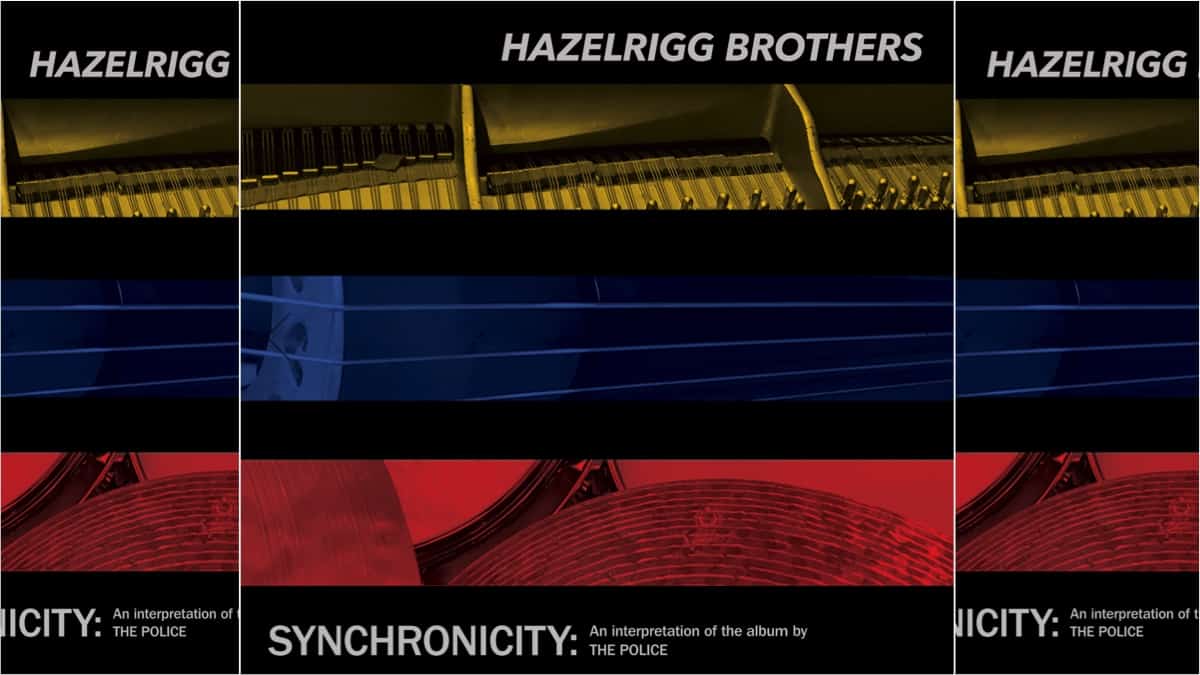
New Album: Hazelrigg Brothers – SYNCHRONICITY: An interpretation of the album by THE POLICE
SYNCHRONICITY: An interpretation of the album by THE POLICE, featuring George Hazelrigg (piano), Geoff Hazelrigg (bass) & John O’Reilly Jr. (drums).
Commemorating and Celebrating the Fortieth Anniversary of the Fifth & Final Studio Album by The Police
What The Critics Are Saying About the Trio’s Debut album, Songs We Like
“…the group has searched for – and found – a process of recording that captures to perfection the experience of hearing a piano trio in the real world – warm and interactive, organic, the bass embracing drums like it does from the seat in one of the front rows of a small jazz club, with the piano dancing inside that musical abrazo, on this highly-engaging debut”
– All About Jazz
“I can’t recommend this album highly enough and I hope to see the Hazelrigg brothers live on the European stage’s sooner rather than later.” – Jazz in Europe
“…one of the best pure trio recordings of the year” – Audiophile Audition
Perfectly expressing the political and social temper of the early 1980s, the original landmark album, Synchronicity, was a near-constant soundtrack to George and Geoff Hazelrigg’s upbringing, and a huge influence on their artistic future. Hazelrigg Brothers celebrates the 40th anniversary of this classic album with Synchronicity: An interpretation of the album by The Police, an audiophile experience full of the fire, power and dynamics that have become their trademark. The album was recorded in one room using two stereo microphones, captured in DSD. Available June 2, 2023 on 180 gram vinyl (mastered from DSD), CD, and digital download through Native DSD, on OuterMarkerRecords.com. “Murder By Numbers” will be available only in digital formats (CD and download).
The origins of this recording go back forty years to Princeton, NJ with two precocious kids tuning into MTV and discovering a whole world of music. The opening notes and images of The Police’s “Every Breath You Take” captivated their young minds, and they were entranced by the videos for “Synchronicity II” and “Wrapped Around Your Finger.”
“There were a ton of videos that we saw on MTV, but those had such major influence. That shapes your brain when you’re a kid. That record is in our blood,” said Geoff. George added, “Synchronicity I is punk as f*ck! It’s so exciting when you hear that riff in the intro. Also, that is the bit of music that Geoff used to test VLCs in the first years of Hazelrigg Industries.” On that note, outside of playing music, the brothers’ “day job” is Hazelrigg Industries HazelriggIndustries.com, as designers and manufacturers of high-end studio recording gear used by top producers, engineers and artists around the world.
The Hazelrigg Brothers did an arrangement of “Synchronicity II” for a recording they made in the nineties, so the idea for this album had been marinating for a while. George elaborates, “We’ve been on this kick with The Police for a long time. We worked on the arrangement for “Miss Gradenko” for years. It went through dozens of iterations before we wound up with what we have on this record.”
This album was born out of love for Synchronicity, arguably The Police’s crowning achievement, and a desire to commemorate and celebrate the album’s fortieth anniversary. “I remember being in high school and having that record on nonstop; I had it in my Walkman forever,” said Geoff. Getting right to point, George added, “I think so many of the songs on the record really resonate, I mean, they’re all so good,” a sentiment most of us can wholeheartedly agree with.
More on the music with the Hazelrigg Brothers:
Synchronicity I
Geoff: It’s got that sequencer part, and we do some of that mechanical kind of playing, but it draws you in, in a hypnotic kind of way. It’s a cool opener, and as a group I think we excel at playing really dynamically. It’s not about how loud you are, it’s how soft you get, because everybody’s always playing as loud as they can. But how soft can you get? And with that tune, we really go from here all the way down. You know, it’s this kind of push pull dynamic thing that happens while maintaining that level of intensity the entire way through. That’s the trick.
Walking in your footsteps
George: It’s about dinosaurs.
Geoff: Yeah. Who doesn’t like dinosaurs?
O My God
George: It’s an illustration of how they were still an underground punk band. “O My God” is questioning religion during the Cold War, which was still a taboo thing to do at the time.
Mother
Geoff: That was the blues on the record, because every jazz album needs a blues, right?
George: This was a challenging one. That song is way too f*cking punk-ass. And it’s a 12 bar blues.
Geoff: That song is about the lyrics, right? And it’s not just the lyrics, it’s the lyrical performance.
George: He doesn’t sing it, right? He speaks it: “The telephone is ringing. Is that my mother on the phone?” And so we had to adapt a melody that wasn’t actually part of the song. But how were we going to capture the lyric of it, and then how were we going to frame it so there was something to grab onto? It was like we need to make it sound like… Chopin, you know?
Miss Gradenko
George: The ultimate Cold War song.
Geoff: You know, it’s only two minutes, but that song has more notes in it than probably any other song on the album.
George: When we first arranged this song, I did not have the facility, the technique, to play it. I went through years of piano studies to finally get to the point where I can play it as well as I can now. I credit that two-minute piece for more of my later technical development as a piano player than almost anything else.
Synchronicity II
George: It has elements of the other songs before it, and sort of puts a bow on that entire first half of the record. There’s a lot of chaos. The breakdown section is the same as the ending of “O my God.” It’s like this chaos that you’re barely, barely holding onto. And so I’m doing a lot of muting and stuff and Geoff’s doing all this screechy bass stuff and John’s playing screechy cymbal sounds. It’s a lot of sound design.
Every Breath You Take
Geoff: The mega-hit from the record.
George: There’s that iconic guitar line, which we carry through the entire song, other than the bridge section and the outro. I don’t play any other notes. It’s a monophonic line that I carry the entire time. Geoff’s playing that melody in that baritone range that has a certain sinister element to it, and it becomes this two-voice piece.
King of Pain
George: Well, we didn’t have a marimba, so John played an mbira. That is the tune where we wind up sounding most like a jazz trio. By the time the outro hits, we’ve distressed the song completely.
Wrapped Around Your Finger
Geoff: Another song that has a lot of lyrical imagery, and our job was to just take that mysterious imagery and do our best to apply it without the words.
George: When Geoff plays the melody on the second verse, he hits the high note and slides to that next note. There’s something in the piano that echoes his high note, and it sounds like there’s an echo on the bass.
Geoff: If you listen to the last chorus, it sounds like we overdub a synth in the middle. It’s just the way the composite sounds come together.
Tea in the Sahara
George: What “Tea in the Sahara” captures is how beautiful all the instruments in that room sound. It captures what is so phenomenal about that 1887 Steinway and just the massive size and tone of Geoff’s 7/8 bass and the delicacy of that birch Gretsch kit, and how John approaches playing cymbals. It’s all just the delicate – impossibly quiet at times – detail, of just how fine those instruments are.
Murder by Numbers
Geoff: I think harmonically and form-wise, it already lends itself to the format probably more than any other song on the record. I mean, it starts with a drum solo and it ends with a drum solo.
Please Visit: Hazelriggbrothers.com
Bass CDs
Reissue: Geddy Lee’s My Favourite Headache and Alex Lifeson’s Victor
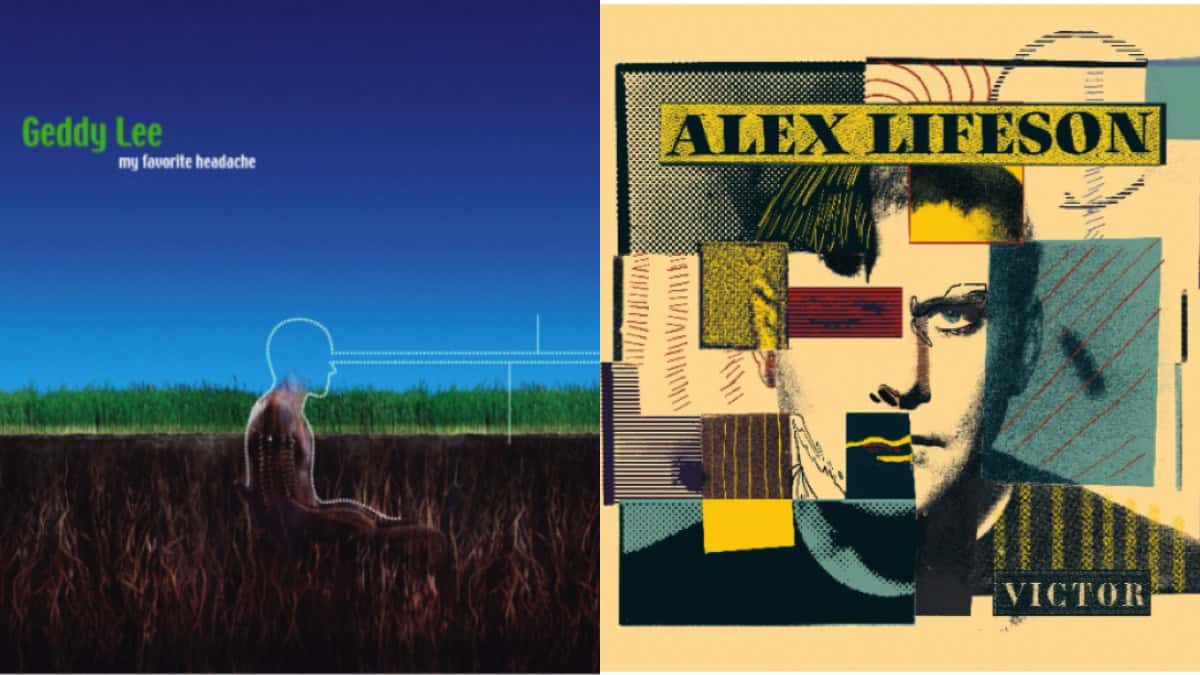
In an exciting announcement for Rush fans and rock enthusiasts alike, Anthem Records in Canada and Rhino Records will reissue the first-ever solo albums of Alex Lifeson and Geddy Lee. Lifeson’s 1996 album Victor and Lee’s 2000 offering My Favourite Headache will be re-released on August 9, 2024, in various formats, including a range of vinyl configurations.
My Favourite Headache, Geddy Lee’s only solo album to date, was initially released on November 14, 2000. This reissue marks its first vinyl pressing since a limited-edition Record Store Day exclusive in 2019. The fourth side of the album features two instrumental mixes. Produced by Lee, Ben Mink, and David Leonard, the album includes contributions from Mink and drummers Matt Cameron (Soundgarden/Pearl Jam) and Jeremy Taggart (Our Lady Peace).
Victor, originally released on January 9, 1996, marks Alex Lifeson’s solo debut. Lifeson took on the roles of songwriter, producer, and mixer for this album. For the first time, Victor will be available on vinyl, featuring a complete remix by Lifeson himself to enhance the audio quality. The fourth side of the album includes four instrumental tracks previously exclusive to Lifeson’s website. Guest artists include lead vocalist Edwin from I Mother Earth, Primus bassist Les Claypool, and Canadian powerhouse vocalist Lisa Dalbello. The 15-song collection is paired with striking 2024 reimagined artwork by Fantoons Animation Studios.
For more details on the Geddy Lee reissue and to preorder, https://lnk.to/MyFavouriteHeadache
For more details on the Alex Lifeson reissue and to preorder, https://lnk.to/AlexLifesonVictor
Bass CDs
New Album: Ben Wolfe, The Understated
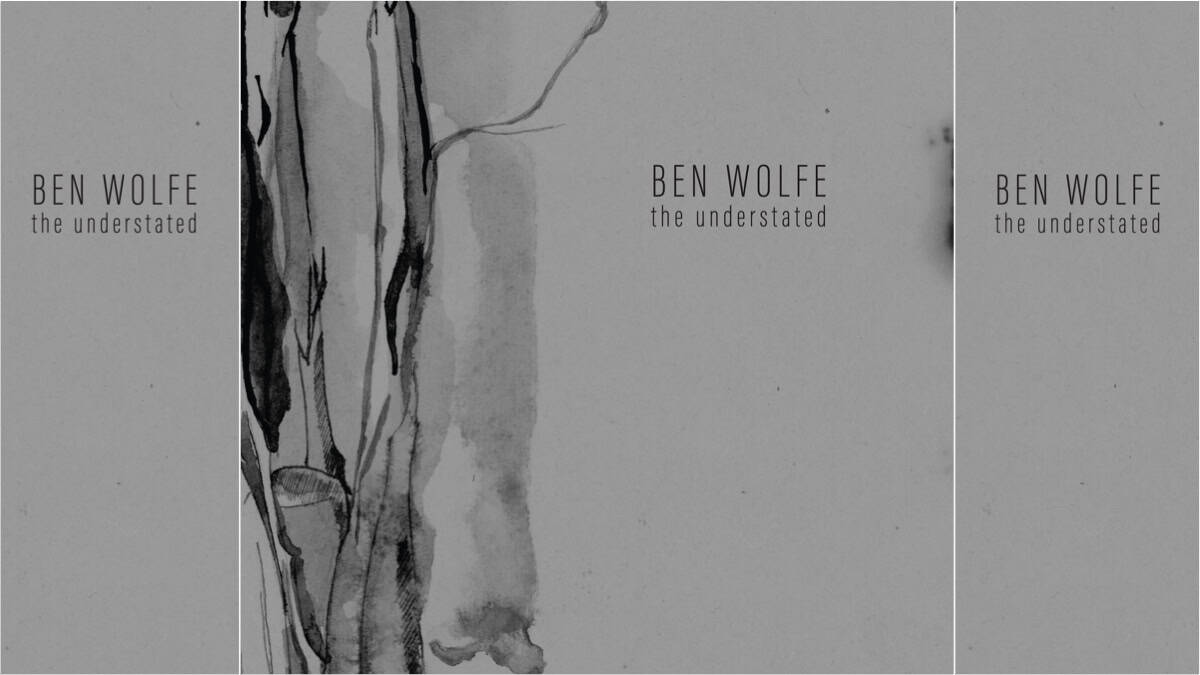
Acclaimed bassist and composer Ben Wolfe is thrilled to announce the August 9, 2024 release of The Understated.
This evocative new album features a collection of new original compositions by Wolfe paired, with re-imaginings of some of the composer’s classic material, with a particular emphasis on the ballad song-form. The album features ten tracks, five of which are ballads – a bold move for any composer – Wolfe creates a cohesive narrative here that challenges the listeners perception of the classic ballad. The Understated features Wolfe alongside artists who make up the very frontline of modern jazz, including pianist Orrin Evans, tenor saxophonist Nicole Glover, drummer Aaron Kimmel, guitarist Russell Malone and pianist Sullivan Fortner.
Wolfe has always been drawn to finding beauty in subtlety. He perceives a certain tranquility and elegance in the Coltrane Quartet, Louis Armstrong’s Hot Fives and Sevens, the legendary Miles Davis bands and rhythm sections, and the music of Charlie Parker. While he, of course, revels at the immense world-building energy of this music, it’s the “other side” – the elusive, magical aspect that endlessly captivates him – the understated. The composer draws inspiration most from the ensemble work of these hallmark jazz ensembles. Despite the individual parts being extraordinarily beautiful on their own, the musicians in these archetypal ensembles play only what is needed to serve the music, paying particular attention to the band-sound more-so than their individual sound. The Understated embodies this ethos with a tremendously impactful ensemble-oriented approach.
Wolfe sought to continue the thread started by “Lullaby in D” from his previous critically acclaimed release Unjust. Wolfe indicates, “Something about that take was so perfect to me. It had been brought to life, and it had that ensemble thing.” Wolfe assembled the quartet who recorded “Lullaby” (including longtime collaborator Orrin Evans, as well as recent frequent collaborators Aaron Kimmel and Nicole Glover) and two very special guests, Russell Malone and Sullivan Fortner. The recording process took place in one room with no headphones or isolation booths, further emphasizing the group’s collective awareness.
This record succeeds in bringing Wolfe’s expansive music to life through extremely conscientious group playing. Nothing is forced or pushed; everything that needs to be stated is stated. The single from the album, “Waltz,” encapsulates the spirit of the project. Wolfe says, “I view albums like a complete painting, so singles have been difficult for me. This song is very much in the spirit of the whole but doesn’t give away the record.” The piece features a sentimental melody delivered with grace by tenor saxophonist Nicole Glover, before Glover and Evans embark on stirring solos dancing in and out of the tune’s harmony.
Other new original compositions featured here include “Ballad in B”, which perhaps best demonstrates the group’s stunning cohesion. This tune is a refreshing diversion as it features a serene repeated melody without overt melodic improvisation. The following track, “Anagram”, begins with Kimmel’s rhythmic refrains and a unison melody played by Glover and Wolfe and is a true ensemble piece. On this track, Wolfe shines with a lyrical solo. The moody short interlude “So Indeed” is a lyrical masterwork that leaves the listener wanting even more. “Beautiful You” features master guitarist Russell Malone on the track’s melody. The emphasis here on restrained lyricism is a prime reminder of the old adage “it’s not the notes you play, it’s the notes you don’t play”. Each pocket of space in between melodic moments leaves room for the listener to breathe deeper and deeper into the song. The driving “Triangle Man” features fantastic improvisation from Glover and Kimmel. The tender “Barely Spoken” concludes the album with a feature for pianist Sullivan Fortner.
The album also weaves in references to Wolfe’s past works, creating a personal musical universe. “The Poet Speaks” is the opening track on his first record, 13 Sketches. “Occam’s Razor” was composed years ago for a collaboration with a choreographer and painter, and was a much different composition in its original form. “Love Is Near” was originally found on The Whisperer. With ballads in particular, Ben uses voicings and sounds that represent certain things to him, intentionally referencing his other compositions to generate connections between his songs.
Wolfe’s tremendous compositions on this album are also influenced by the group of musicians that he assembled for this release. Wolfe remarks “One of the things these five musicians share in common is that not only are they true ensemble players, they will always play something unexpected and special.” Listeners will find calm and beauty within the ensemble performances throughout The Understated.
Visit online at benwolfe.com/
Bass CDs
New Album: Orlando le Fleming, Wandering Talk
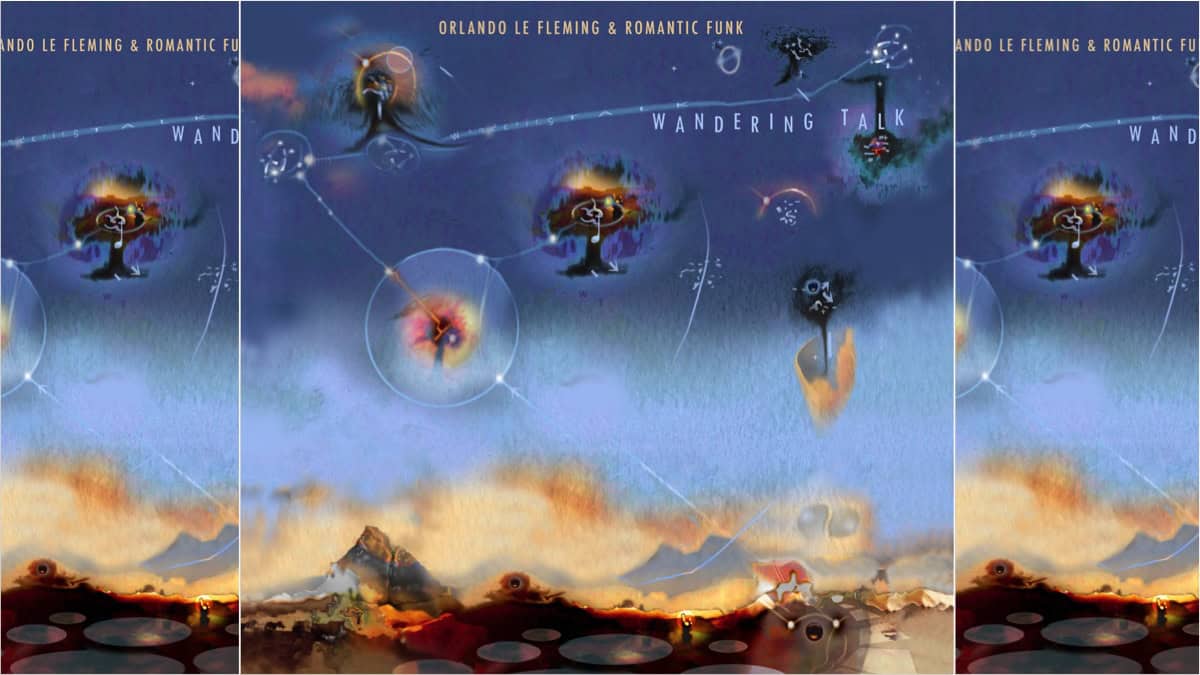
Bassist, band leader, and composer Orlando le Fleming continues to make music that crosses genres as readily as he crosses the Atlantic, with this new album ‘Wandering Talk’, to be released physically on 23rd August via the UK’s premiere jazz label, Whirlwind Recordings.
After 20 years in New York City, he’s back in his native UK, forging new pathways and renewing old partnerships. His love for the acoustic tradition continues unabated alongside his deep affection for the robust, muscular electric fusion that emerged in the 1980s, and he has received critical acclaim from media including The Guardian, Financial Times, Jazzwise, and All About Jazz among others. He has also toured and recorded with some of the world’s greatest jazz musicians including Branford Marsalis, Kurt Rosenwinkel, Antonio Sanchez, Ari Hoenig, and Wayne Krantz.
The Romantic Funk project was born in New York’s legendary 55 Bar to explore that legacy: now the new album ‘Wandering Talk’ builds on the critical acclaim generated by ‘The Unfamiliar’ (2020), building on the framework with a set of collaborators that brings together London and New York, past and present, acoustic, and electric, and merges it all into a spectacular whole.
Following the same principles that served the project in NYC, le Fleming booked four Friday nights at London’s renowned Vortex Club to workshop the music that would become the album, with a rotating cast of players which he honed down into the final line-up. Old London friends Tom Cawley (piano/keys) and James Maddren (drums) completed the rhythm section. New acquaintance Nathaniel Facey was picked from the ranks of the UK’s brightest young saxophone players. NYC stalwart Philip Dizack flew in from the US to play trumpet and reaching back to Orlando’s school days and forward to his own family, one-time classmate Chris Martin (Coldplay) and his own daughter Nadia combined to provide vocals on a special setting of Rumi’s poetry.
As before, the music combines fusion’s flash and fire with a contemporary sensibility. This time, Orlando’s questing spirit sends his superb band forward to investigate fresh areas of creativity in dynamic and texture.
Visit online at orlandolefleming.com
Bass CDs
Album: John Entwistle, Rarities Oxhumed – Volume Two
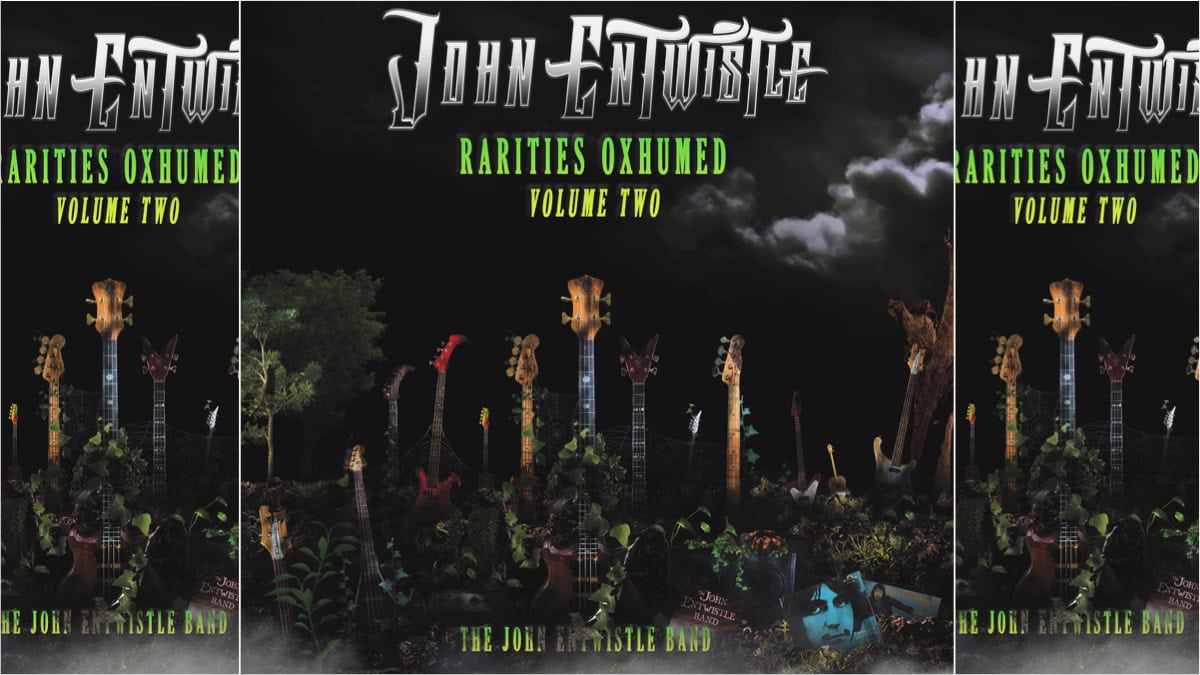
Album: John Entwistle, Rarities Oxhumed – Volume Two
Rarities Oxhumed – Volume Two is the second of the series of posthumous releases coming from John Entwistle.
Rarities Oxhumed – Volume Two is a compilation that was curated by drummer Steve Luongo, who served as John Entwistle’s producer, bandmate, business partner and good friend for many years. As Luongo states, “When I agreed to do two volumes of John Entwistle rarities, I knew volume two had to be even better than volume one. It is!” The collection of songs on Volume Two are from his years with the John Entwistle Band and include re-mastered versions of studio tracks including “Endless Vacation”, alternate mixes of tracks like “Sometimes”, and live tracks including The Who cuts “Real Me”, “Long Live Rock” and an epic version of “Young Man Blues”. The latest preview track to be released is the Who cut “Had Enough.”
Listen to “Had Enough” here: push.fm/ps/hadenough
Rarities Oxhumed – Volume One was quickly embraced by longtime fans as it featured gems like “Bogey Man” featuring Keith Moon, “Where You Going Now” (demo for the Who), and a raw live version of “Trick of the Light” recorded during the John Entwistle Band’s final tour in 2001. Deko Entertainment is thrilled to have been able to bring both volumes of this unearthed music of John Entwistle to the fans and forever solidify him as one of the greatest rock musicians ever.
For more information, visit online at dekoentertainment.com/john-entwistle
Bass CDs
Album Review: Mark Egan, Cross Currents
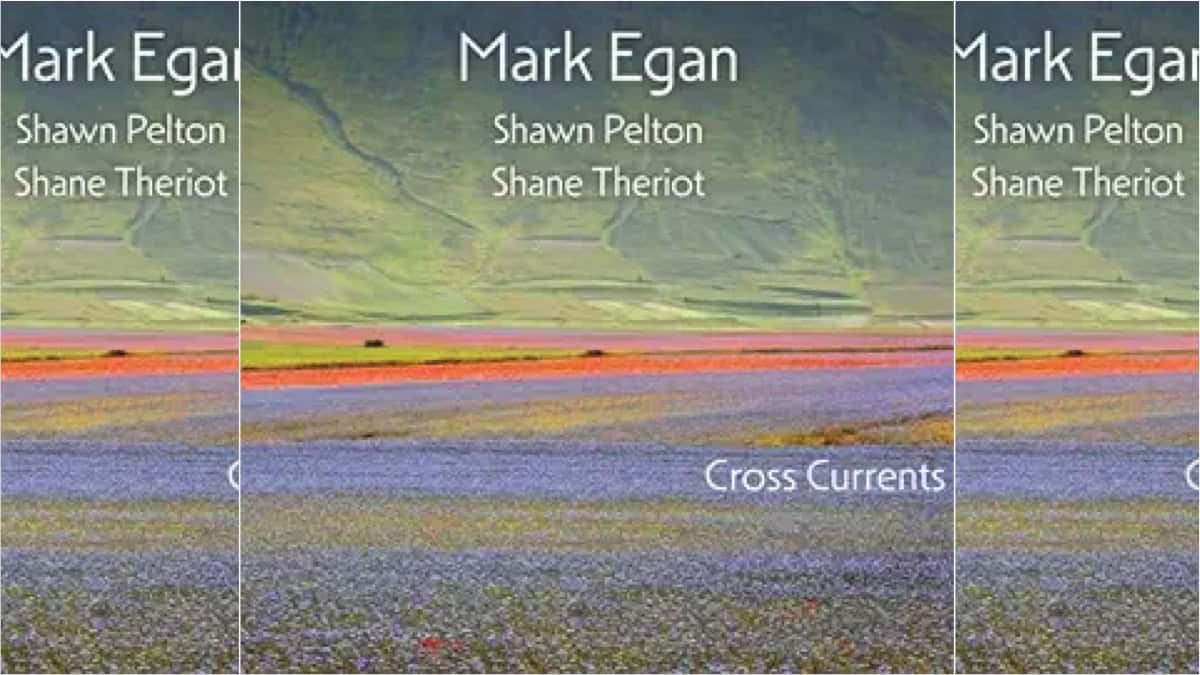
Mark Egan, Cross Currents…
It is exciting every time I get a new album from Mark Egan as he is such an amazingly versatile player and I never know what to expect (except for excellent artistry!) In his latest release, Mark has teamed up with Shawn Peyton on drums and Shane Theriot on guitar to bring us “Cross Currents”.
This collection of eleven tracks transports me to the Gulf Coast (New Orleans specifically). Mark’s fretless basses lay down a solid groove and lots of juicy solo work for this rootsy collection of funk, ambient, swamp-rock, second line, ballads, Cajun and even Indian Raga.
This trio is super-tight and the musicianship is flawless as each member has ample opportunity to shine. Even though each player is very talented in their own right, I feel that the collective energy is greater than just the sum of the players on this album. Each musician contributed to composing music for this project but the lion’s share are Mark’s original pieces.
I spent the summer of 1981 in New Orleans and this wonderful music takes me back to those fond memories. I participated in a wacky raft race on Lake Ponchatrain and this opening track elicits images of fun, sunshine, music, and great food.
This is another superb album that everyone will enjoy. Get your copy today! Cross Currents is available online at Amazon.com. Visit Mark online at markegan.com.





















